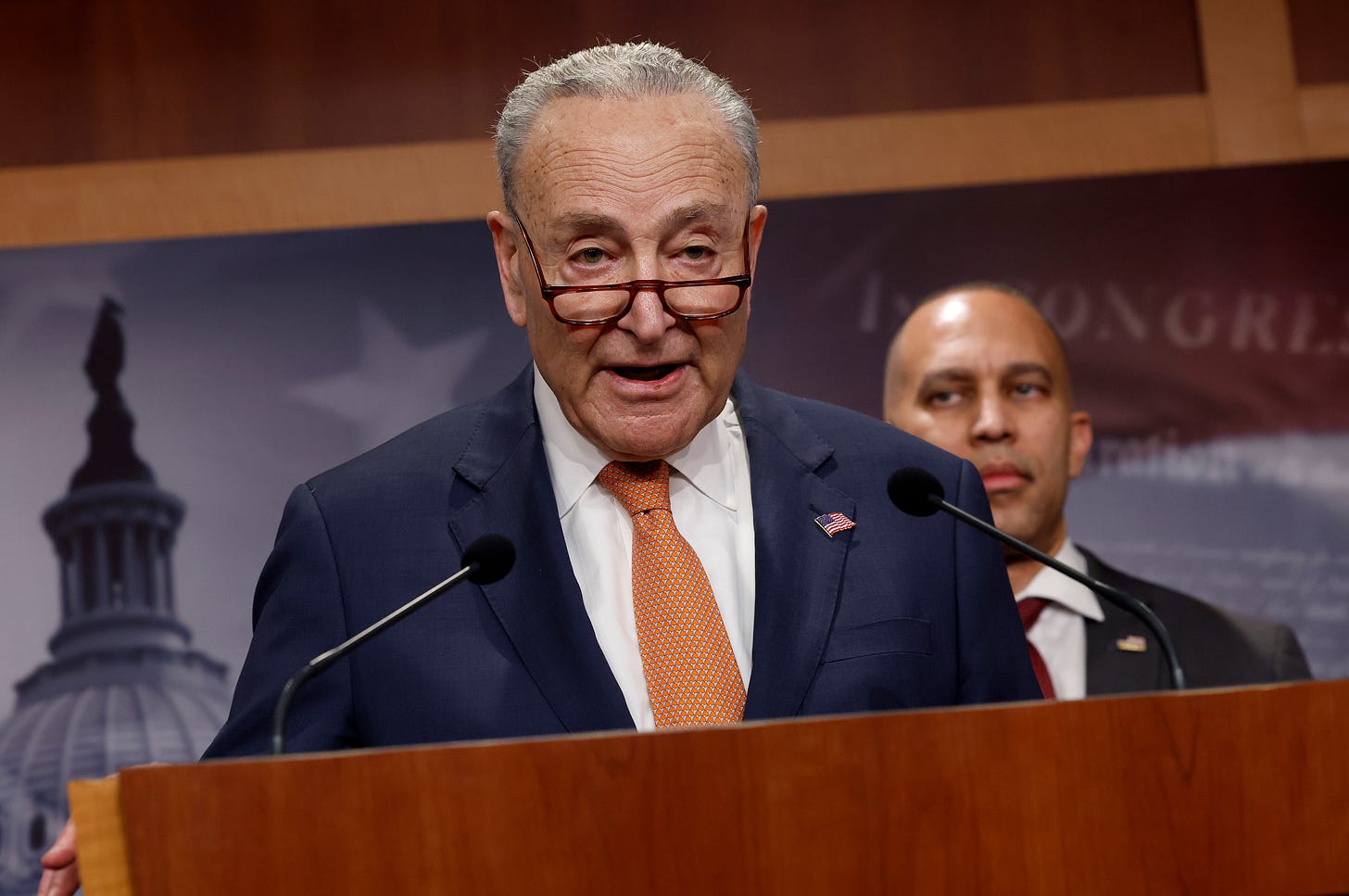It's time for Democrats to show some spine
In the shutdown showdown, if Dems demand nothing, that's exactly what they'll get.
PN is supported by paid subscribers. Become one 👇
Asked last week about the possibility of a government shutdown — which will occur if Congress doesn’t pass a budget resolution by the end of the month — President Trump railed against Democrats for their supposed devotion to politics over substance.
“We could give the greatest budget ever— tax cut of 50 percent, everybody taken care of, perfect for women, perfect for men, perfect for minorities, perfect for everything and we wouldn’t get one vote for the Democrats. Because they’ve lost their minds, they are so deranged. They have Trump derangement syndrome,” he said. “These are sick people and I think we’re going to have a tremendous midterm.”
Sift through the world salad and it’s possible to discern exactly what’s going on here, even if Trump’s analysis is the only thing that’s truly deranged. The midterms do indeed loom over this conflict — and Republicans are the ones most worried about how a shutdown would affect their fortunes.
This will not be settled by a bill that’s “perfect” for various demographic groups, however that might be understood. Instead, the choice is between a new round of disastrous cuts to government and a Republican Party allowed to trample the law and the separation of powers, or an outcome that might, in some small way, impede a president who grows more dictatorial with each passing day. And as a bonus, standing up for themselves would be good politics for Democrats.
While a continuing resolution that keeps the government open will almost certainly pass the House, in the Senate it must survive a filibuster, meaning it would need the votes of seven Democrats. Withhold those votes, and on midnight of September 30, the shutdown begins.
The politics of shutdowns
There have been five government shutdowns in the last 30 years, and two in Trump’s first term — including the longest shutdown in history, which lasted 35 days between December 2018 and February 2019.
While each one may be triggered by a particular set of policy disagreements — for instance, that 2018-2019 shutdown revolved around funding for Trump’s border wall — the politics are always about how much pain each party is willing to subject the country to, and who gets the blame.
The answer to the second question is usually Republicans. This is not only because they have more often forced these confrontations, but because in the face of complicated Washington maneuvering, voters often default to the assumption that the party that hates government must be the ones who want to shut it down. In 2018-19, the shutdown ended when Trump caved, as he often does when he encounters real resistance.
This time, Republicans are in an even more vulnerable position than usual. Trump is not only broadly unpopular, his war on American cities is unpopular, too; in the latest CBS News poll, for instance, 57 percent of respondents opposed his military invasion of Washington DC and 61 percent said they’d oppose him sending troops to their area. The Big Beautiful Bill was so unpopular that now Republicans are scrambling to rebrand it as the “Working Families Tax Cut Bill.” As the economy looks like it’s heading south, that will probably be futile.
Back in March, at Senate Minority Leader Chuck Schumer’s urging, Democrats accepted a funding agreement that temporarily kept the government open. But they didn’t get much of anything in return for their cooperation.
“One thing that’s different from back then: Donald Trump at the beginning of this year, he was 9 points up,” said Sen. Amy Klobuchar earlier this month. But now, “he’s 9 points under.”
Klobuchar’s comments are a tacit admission that in March, Democrats were acting out of fear, which — let’s be honest — is their default position. But what do they have to be afraid of now?
It’s true that bad things will happen if the government closes its operations — even a government limping along after the brutal and arbitrary cuts imposed by DOGE. And Republicans do have one advantage over Democrats in any game of shutdown chicken: Democrats actually care about the things the federal government does and the people who would be hurt by a shutdown, while most Republicans don’t.
But the scales are brought back into balance by the political danger to Republicans. They’re in charge, they’re the ones trying to destroy the capacity of the government to function, and so they’re likely to get the bulk of the blame. And they’re already frightened of getting blown out in next year’s midterms.
The danger is that once again, Democrats will save the GOP from itself.
“We don’t want a shutdown,” Schumer recently said. “We want bipartisan negotiations and a bipartisan bill. If Republicans want to keep the government open, they’ve got to work with us.”
The problem is that there is no such thing as bipartisanship right now. And even if you believe this is just rhetoric, what precisely is the political gain to be had for Democrats in looking as though they want to be bipartisan? Democrats have spent decades hoping that voters will reward them for being responsible and reasonable, for reaching across the aisle to avoid disaster, for acting like the adults in the room. What have they gotten for it? Not a thing.
Republican policy plans must be stopped
If there is going to be a showdown, it would be far better that it revolve not around whether John Thune and Mike Johnson are being sufficiently bipartisan in the negotiations — which voters won’t be aware of and couldn’t give a damn about even if they were — than what Republicans are actually doing to the country.
While this is all going on, for instance, Republicans are proposing drastic new cuts to spending on healthcare and education, even beyond the horrors of the Big Beautiful Bill. The administration has declared its right to deploy an illegal “pocket rescission” through which it refuses to spend funds that are already required by law. And very soon, most of the 24 million Americans who get their health insurance through the Affordable Care Act exchanges will see a dramatic jump in their premiums, thanks to the expiration of enhanced subsidies passed during the covid pandemic. That includes millions in Republican states: Florida has more people who get their insurance through the exchange — 4.7 million — than any other state, while Texas comes in second with just under 4 million enrolled.
That looming premium spike hasn’t gotten national attention, but it is making some in the GOP very nervous, which is why a group of vulnerable House Republicans from swing districts introduced a bill to extend the subsidies for a year — until after the midterms.
These are all pressure points, places where Democrats can start making demands. Not saying “we need bipartisanship,” but telling Republicans: Here are the things this bill has to include to get our votes, or the government shuts down. The bill has to explicitly bar pocket recissions. It has to extend those ACA subsidies not just until the midterms, but for much longer — maybe permanently. It has to take more cuts to healthcare off the table.
And Democrats should go ahead and come up with some other demands for good measure. Whatever they decide on, it has to be substantive and specific so voters can understand what they’re fighting for. Because if they say they’re fighting for “bipartisanship,” voters won’t care.
Will they get everything they’ve demanded when the conflict comes to an end and a bill is passed to keep the government open? Probably not. But if they ask for nothing, that’s exactly what they’ll get.
The good news for Democrats is that they have won battles over government shutdowns before. All that’s necessary is for them to define the stakes and stick to their guns. If you have doubts about the courage, determination, and political acumen of Chuck Schumer and Hakeem Jeffries, you’re not alone. But this is something even they should be capable of achieving.
That’s it for today
We’ll be back with more tomorrow. If you appreciate this edition, please do your part to keep Public Notice free by signing up for a paid subscription.
Thanks for reading.







Painting the entire party with the same brush is easy to do, and unfair. There are many who are fighting everyday, visibly, and many others behind the scenes. My rep is a member of "The Squad"...she's done a remarkable job for our district, and has been very vocal, protesting, demonstrating, against Hair Furor's policies. I'm fully expecting the words "bipartisan", "friends", "colleagues" to be overused by Democratic Party Leadership in the coming weeks, allowing them to be backed into a corner and blamed for not accommodating the terrorists, otherwise know as "Republicans", and caving to further demands. I'm baffled as to why party leadership is so afraid to take the language and tactics of the Republicans and turn the tables on them. In a world of Schumers and Jeffries, be like AOC, be like Jasmine Crockett, be like Moskowitz, be like Jamie Raskin. The leadership is there, it's just not in The Leadership.
It's time for the professional Dem haters to stop recycling cliches and tropes about "Democrats getting a spine". I know it's a profitable business model but I'm not subsidizing it anymore. It is not helpful.